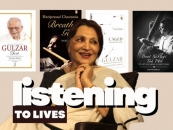-853X543.jpg)
Dr SUCHETAN PRADHAN: THE CULTURE BEHIND DENTISTRY
by Aparajita Krishna August 19 2023, 12:00 am Estimated Reading Time: 22 mins, 13 secsI am in conversation with one of India’s best known practicing dentists: an implant aesthetic and laser dentist, writes Aparajita Krishna.
I strongly recommend this article. My full-toothed-smiling emojis do so. I majorly owe my smile and munching, chewing in life to the Pradhan Dental Centre (PDC), Mumbai. I was one of the early-years’ patient at PDC. Apart from regular dental issues I also got my set of teeth a little beautified. Cosmetic dentistry. No apologies. I smile from my heart and teeth. That apart, he is a doctor to Mumbai’s most noted and varied citizenry. PDC describes itself as ‘Beyond Dentistry, Artistry’. The gallery of photos speaks of dentistry and artistry. There is a photo herein of the Doc with Madhuri Dixit and her smile at the Smile India Movement3. And interestingly there is also a photo herein of the Doc himself in the patient’s chair getting his teeth fixed by doctor-colleague-wife Shalini Pradhan.
Most importantly this is a piece that is so very informative about not just the world of dentistry, but also about art-culture-theatre-life-doctorhood that he parentally inherited.
Suchetan means achchi-chetna-wala, well-disposed, gracious, alert, conscious, distinguished. All of these epithets apply to Dr Suchetan Pradhan.
How would you professionally describe yourself? Your resume, information on you, reputation, is awe-inspiring. Do give us a brief on your qualifications and work.
I would call myself an implant aesthetic and laser dentist. I did my BDS, MDS at Nair Hospital Dental College, Mumbai. Then I was in the USA for a year and did my implant program. I am also a trained lab technician. That helps in my aesthetic work. Upon my return to Mumbai, I set up my practice in 1988. I also did my MSC in laser dentistry from Arkin University in Germany. That was in 2008. I am on the faculty and director at MCODS, Manipal, of their Laser Dentistry program. I am also a visiting professor and on the faculty of D Y Patil College, Navi Mumbai, and run their program on laser dentistry. I have always been on the lecture circuit and that has helped me learn. I was also invited to speak at various universities, including Harvard School of Dental Medicine. There I did a program for the post-graduate students. The questions that I got were incredible. They made me think. If you want to grow you need to teach. You then understand the dynamics of where you are coming from as also the science you are coming from.
I was also a visiting professor at the Taipei Medical University, Taiwan, till 2017. I have lectured in 25 counties in the last count. Pradhan Dental Centre has been at the very cutting edge of what we offer in our practices.
You are the son of stage-thespian, film actor Mrs. Sunila Pradhan. Your father Dr. Vijaykumar Pradhan was a pediatrician. You have a sister, Mrs Sucharita Adhai. You come from a wonderful mix of doctor-father and theatre veteran-mother, Sunila Pradhan. Do give us a peep into your familial domestic scenario.
I come from a family of doctors. My paternal grandfather, uncle, father were all doctors. The medical side of it was always a pressure on me to become a doctor. I have a sister who has nothing to do with either medicine or theatre. And the influences in my life as a child were varied. So, if I have to describe myself, I would say it was because of my mother’s theatre influences that I had a very liberal education at home. Schools those days were not so liberal. My home environment was extremely liberal. We will talk about that as we go along. My influences went beyond just becoming a doctor because of my mother’s influence and the people she interacted with. So, my influences were artsy as well. That was a great mix. It really helped me in my career. Dentistry is a mix of science and art. That was where I blossomed and flowered. It really helped me in my life.
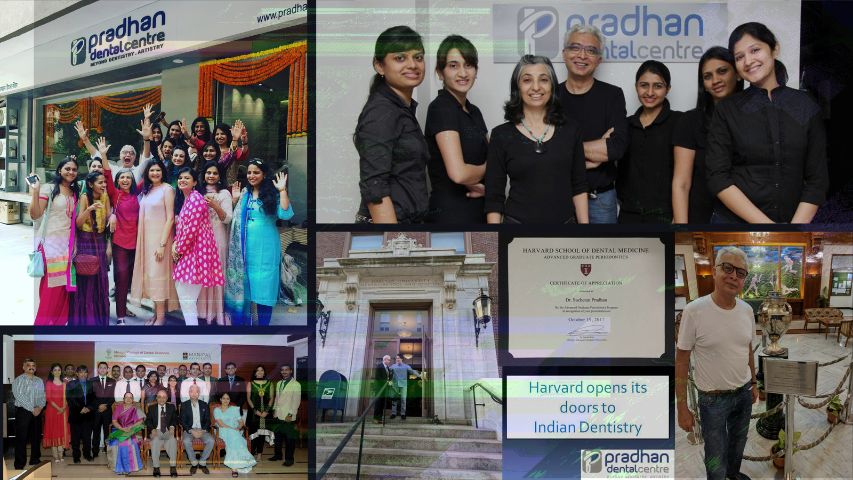
Where did you do your schooling from? Was being a doctor and that too a dentist of this repute always a plan, a dream, since boyhood?
That’s a very interesting question. I actually went to a vernacular school. It was an English medium school, but it was not an elite school like Cathedral etc. I went to a school called IES at Dadar, which had a middle class mix of students. It helped me in not being an elitist in many ways. I could understand that perspective. Many of those mates are still my friends. Most of them now live in the U.S.A. That was their escape from the economic situation in this country at that time. Now more than 70% of my class lives in the U.S.A and have done extremely well for themselves. They were hungry so they did well.
In my case there was always parental pressure, mainly from my father’s side, to become a doctor. In my father’s time doctors were not just doctors, they were social workers. They had to be available at any given time. A patient would just land up at 2.30 am in the morning at home. ‘Look my baby is not well. Please find a solution’. So, I saw that and decided that whatever I do in life I am not going to be in that situation.
I met a lot of very, very interesting people in dentistry and through the practice. As you know we treat a lot of celebrities. But not only that. I was also able to put my aesthetic senses, which I was always interested in, the artsy side, into my dental practice. That helped us become who we are.
Figuratively speaking, were there teething troubles/problems at the start of your independent practice? Were people open to your kind of a dental makeover?
There were a lot of teething problems when I came back from the U.S.A. and wanted to open a practice. We had a bungalow in Juhu, of course, but my father was not a wealthy man. Doctors then were not wealthy people. I looked at places to practice. Back then Juhu was the backwaters, a very sleepy little hamlet, so to say, with little houses and population density very low. So, this house then was not a good place to practice. I looked at places in Bandra. I did not want to go beyond Bandra. The only places my father could afford were garages in buildings. I was not looking at opening my practice there. I wanted it at a higher level. So, my grandfather who was part owner of this house where I live now suggested why not open my practice in our house itself at Juhu?
So, I took a part of his part of the house and I put my first chair over there. And, I did not have to pay for the space. But what it also meant was that I was in a tiny sleepy hamlet. Who is going to come here? People said, ‘Are You Mad?’ Remember this was Juhu back in 1988. That threw a challenge to me and I said, ‘I will show you guys. I will practice without a board.’ I did not have a nameplate outside my clinic for a very, very long time, till the mid-2000. It was an ego thing with me. In hindsight it sounds stupid. But at that point it was something I was proud of.
There were teething problems, but to be fair I took a bank loan of 2 lacs for the equipment. When I was signing that loan paper my hands were shaking. I never took a pie from my father after we opened the practice. I was able to support my own practice. That was a plus for me.
Do recall your early patients. If privacy is not a problem. Else you can camouflage and inform.
I must say that I was very well supported by the theatre and the film industry. Especially people who I grew up seeing in my house. But then you can also say that a person you know may feel, ‘How can I go to him as a doctor? I have seen him grow up in front of me.’ But there was only encouragement. In fact, my first implant patient on whom I did implant in India was on 14th August 1988. He was a very famous man who we all revered, knew and respected. He was Satyadev Dubey.
Dubs was like a godfather to me. You know that. He came and told me, ‘Look I am wearing dentures and I don’t like them. So can you do something for me?’ I said, ‘of course’. I decided to do implants for him. Dubs became one of my spokespersons for the practice. Similarly, Amrish Puri Saheb, who was akin to a father figure in my life. He really encouraged me, promoted my practice and even wrote a little paragraph in his autobiography about me and how fond of me he was. He encouraged me to take my practice to the next level.
I must tell you a very interesting thing that happened once. Kabir Bedi, who is now a very close friend, told me back then, ‘Doc I am so happy! All this time living in Juhu I was going to garages for dental treatment.’
Dentistry in those days was not a very paying profession. Dentistry then was only about extraction and dentures. There were not any great cosmetic treatments available. Orthodontic braces were in its infancy in those days. It was on the whole a backward part of medicine. Doctors did not consider us doctors. There was a kind of discrimination. So, when Kabir said, ‘I am so happy to see a practice like this’, it mattered. He is still a friend. I must have done something right.
These people promoted our practice. Juhu became one of the places where a lot of the film industry now lived. The convenience factor also came in. Then my contacts. Having seen many of them at home as a child, that too helped.
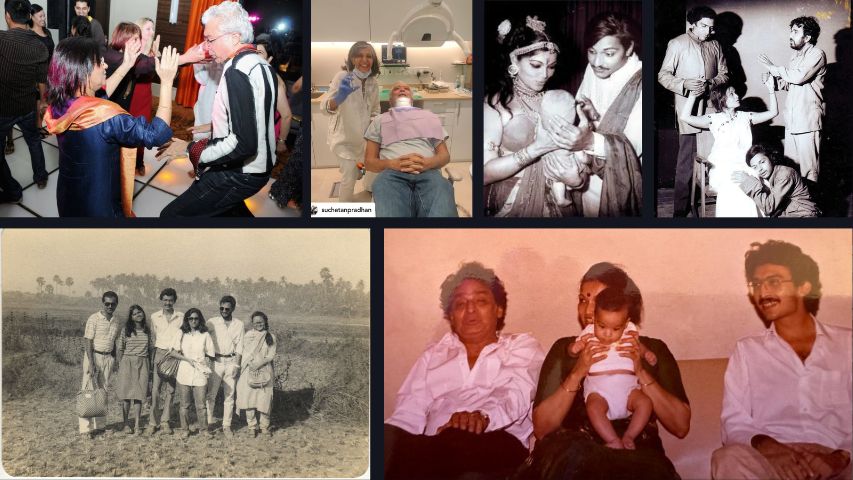
I know and your part of the world knows that your centers service the very, very well-known celebrities, public figures too. Share what you would want to.
We were fortunate that I was in the right profession at the right time. In the sense that at that time Bollywood was peaking. Television was just beginning. It was then not such a mainstream force that it became in the 2000. We have had the fortune of not only treating movie stars but producers, directors, singers, song-writers, music-directors, the works. Somebody said to me the other day, ‘At least 80% of the film industry here must have come to your practice!’ Which is true.
Now when I go for any of these award shows I know virtually everybody there. That makes me feel really good. A lot of people have said complimentary things about me. Mahesh Bhatt has said it. He gave an interview to Arbaaz Khan and therein Arbaaz mentioned about Anupam Kher having to pay Mahesh a royalty whenever he meets him (as a friendship tradition for having given him the break in Saaransh). He mentioned that when Anupam was sitting on the chair at Pradhan Dental Centre and Mahesh went into the operatory, he said ‘Anupam I am here’ and Anupam puts his hand in his pocket and takes out notes and gives him. Prasoon Joshi has said good things about us. I can tell you who has disclosed it. So, I am talking about it.
I was doing a program for Procter & Gamble. They had this Smile India campaign. This was about 10 years back. They had Sonali Bendre and Prachi Desai as the celebrities and I was doing the lecture for the press. There were 150 press, TV cameras. After I finished my presentation, Sonali Bendre and Prachi Desai came up. Someone asked Sonali, ‘What is the secret of your great smile?’ Sonali just pointed to me and said, ‘Him’. It was shocking in a way, but it was so thrilling.
I respect Sonali as an individual and secondly that she found it okay to say this in front of the people, press. About 70-80% of the film-industry here have come to us at some point of time or the other. We have also had the fortune of treating the industrialists. Because I was in the Hinduja Hospital, I had the opportunity there to treat a lot of celebrities, ministers and top industrialists. I have been very lucky. Also, what we were doing in the implant industry, very few people were doing in India. At the level we were doing at.
One very interesting incident happened. Krishna Shah, the film-producer who made Shalimar the film, was a scriptwriter in Hollywood and was on the Academy Awards committee. He became a patient and a friend. One day in the late 1990s he said, ‘Suchetan, why don’t you come to LA. I am doing the Oscars there. I will take you to the parties and organize a press-conference with the NRI press.’ I landed up there. He was very sweet. He organized a press conference for me as a friend. I have had the great fortune of being friends with these people.
I can also say with great pride that Chetan Anand and Priya Rajvansh were close friends of mine. Even though Chetan Saheb was way older than me. When he was on his death bed at Hinduja hospital, I said, ‘Chetan Saheb, you have not written your biography!’ His was a very interesting life and what he achieved was amazing.
Today Mahesh Bhatt and Soni Razdan, Neena Gupta, Jayant Kripalani and Gulan Kripalani, are amongst my closest friends.
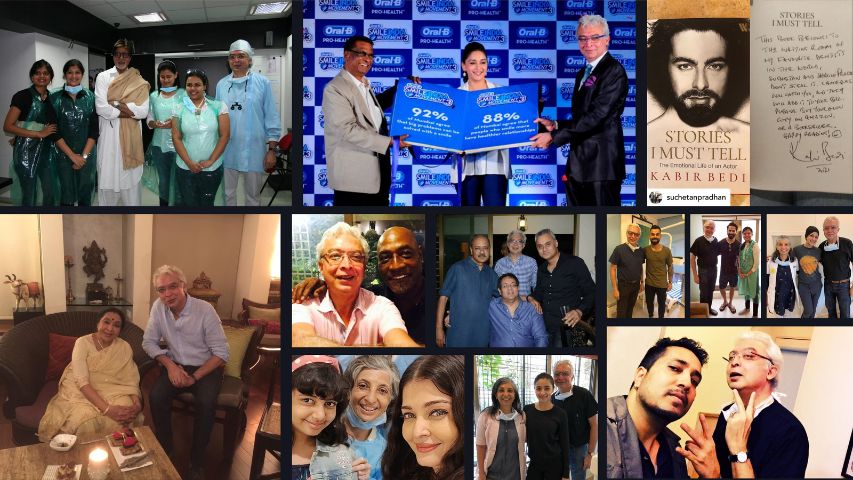
You have been as a child-youngster-adult surrounded with creative influences. To quote Ratna Pathak Shah, Hindustan Times April 13, 2019, “Amrish Puri sold insurance all his life and did theatre, until he started doing films. Early in the morning, he would land up in Sunila Pradhan’s house to rehearse and then take his motorcycle all the way to town to his office, then come back and join the rehearsals at Dubey’s house”.
Do recall further the presence and influence of Satyadev Dubey in your life. I know it is very personal and close. And, of the theatre/film creative people who would gather in your house, life.
I think this is a very important question, personally for me. People know what the influences on my life were because I was part of the theatre-film milieu in that era. But theatre in those days was avant-garde. It was not a paying proposition. It never is majorly. But in those days, theatre was kind of in its infancy, and Satyadev Dubey along with 4-5 other people, like Alkazi, Girish Karnad, Shambhu Mitra, others, helmed it. But then how many people were really involved with theatre? They did not have the financial wherewithal. They had to support each other. So, they had to have a separate job as well. Everybody in the theater had other jobs. Dubey was doing theater as a hobby.
There was of course professional Marathi theatre also. Kashinath Ghanekar and Prabhakar Panshikar were the kind of people doing professional theatre. But Dubey was a firebrand. He was from Bilaspur and wanted to play cricket here in Bombay. He was a leg spinner. That was also something we had in common. We were very, very fond of cricket. We would discuss cricket ad-nauseum. More than that Dubey was a godfather to me. He was my go-to person. When I was in difficulty, I wanted to ask questions, my father was never there. And with my grandfather, with whom I was very close, there was a generational gap. A lot of what I am as an individual has been fashioned by his way of thinking, and liberal thought processes.
Dubey was an RSS person. He believed in cultural Hinduism, but a liberal. He shaped a lot of people’s destinies in those days. What Ratna has said about Puri Saab is very true. Puri Saab used to work with ESIS for many years. In fact, he was a late bloomer. His first film role was in Prem Pujari in 1970, by which time he was already in his late 30s. He, Amol Palekar, Chitra Palekar, Naseeruddin Shah, Ratna Pathak would all be over at our house. Ours was an upper middle-class household. Food was always available. Alcohol was always available. So, there were a lot of theater parties, soirees, happening in our house. It became a place where theatre would meet.
In my teens, from age 13, I would be the bar-tender. I loved doing that. Danny, Kabir Bedi, Parveen Babi, Mahesh Bhatt, all have come to our house in those days. It was a very eclectic kind of a household. As also the party conversations we had. If you remember Govind Nihalani’s film, Party, based on Mahesh Elkunchwar’s play, I think the idea came to Mahesh Elkunchwar when he was sitting in our house one day and watching this whole party unfold. If you look at the characters of those who host the party, and the husband is disassociated from that world, I think he took my father as the influence for that. I have had these amazing influences in my life. I am very thankful. For that I will thank my mother every day of my life. Those who shaped me and made me who I am. It shaped my thinking and I understood inclusivity, the art world, what makes it tick.
One of my great childhood memories, very vivid in my mind, is of our old house. Pula Deshpande and Bhupen Hazarika started singing at 12 pm at night. I was a 10-year-old kid. This was in the early 1970s. They tried to outdo each other. You know how it is with performers, great artistes. Both were at their high! I recall at 5.30 am in the morning the sun rising and both of them singing Bhairavi. It was a private gathering of 15 people. This was the milieu we lived in in those days. Vijay Tendulkar’s family used to be there. These were the influences as also the conversations that flowed from there.
Now the world has become a different place. Then the conversations were principled to an extent that they would discuss naitik, ethical things. Today it is about artificial intelligence, economy. I am not saying it’s wrong. But those influences also taught me the artistic vision. Girish Karnad used to come over as did Shyam Benegal, Neera Benegal, Sunil Shanbag. I have spent so much time with them. Then Jayant and Gulan Kripalani. I can keep naming. These people were friends and had a major impact on my life.
Dubs (Dubey) was very protective towards me. He forced my parents to allow me to take a gap year. He said, ‘It’s a long life! What are you worried about?’ He convinced my parents to allow me a gap year after my 12th grade. Before joining dental school. I would sit in the British Council library and read and read and keep reading through the day. That shaped me and had a major influence on my life. Dubs protected me in many ways when it came to my choices in life. I am eternally grateful for him coming into my life.
I have over all these years seen you and wife Dr. Shalini Pradhan as colleagues, comrades, so efficiently running PDC. Tell us what you would want to, about the importance of such a partnership in a field such as yours.
I think it’s important that one has a team. As one individual it would have been very difficult to do lecturing and what I did in dentistry. We had a big practice. Just between Shalini and me we would treat 40-50 patients in a day. Then Dr Madhavi joined. I used to work in the morning at Hinduja Hospital and then come back in the afternoon and start working till 9.30 pm at night. So, if I did not have the support that Shalini provided me we would not have been successful.
Talking personally whether it’s a good idea to have a wife as a professional partner? Well, it cuts both ways. If you are working together, you are there 24 hours a day together, seeing each other all through the day. So, what we did in the clinic was not discussed at home. We tried to keep our personal and professional lives as separate as possible. That helped our marriage. Every marriage has its tugs and pulls. We also had a huge group of friends. I am so glad. It added another dimension to our lives. None of my friends are doctors. They were all from the media world, advertising, film, theatre. It gave us a different perspective.
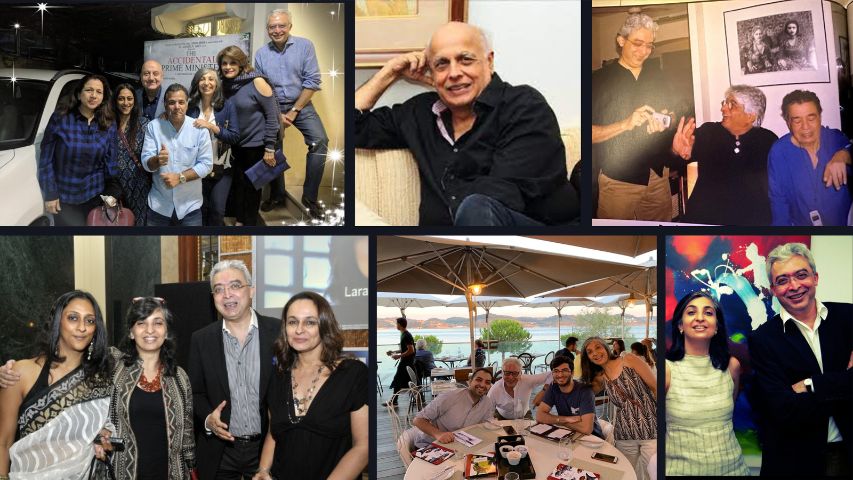
How old are your two sons, Siddhant and Samved? Do they feel inclined towards being dentists?
Sidhanth is 32, Samved is 27. Sidhanth is an Oral Surgeon. He has done his BDS, MDS from Mumbai. Then he was in Manchester doing his certificate program in oral surgery for 2 years. He has just joined our practice. I am happy we now have a person in our family who will be taking over the practice when I finally hang up my boots. Of course, I have no intentions of retiring completely, but I will take it easy as one ages. Samved is a lawyer. He did his undergraduate degree from UCLA in California and his law in Mumbai. He is now a practicing lawyer in one of the leading firms. So, I am happy that they are both well settled. I look forward to growing old with them.
On the global map how is the Indian dental industry placed?
When I started practicing in 1988 after returning from the USA, the Indian dentistry was not very good. Little pockets had decent dentistry. But most of them were not comparable to what was happening in the west. But our generation, my generation, has been the harbinger of change. We are partly responsible for where Indian dentistry is today. Today we are getting there to be at par with the world. A lot of our dental procedures are now comparable to what happens in the west. Certain clinics like ours would be comparable with the rest of the world. But these are pockets. Rest of the country still has to develop to that level of skill and technology sets. I think that will take its time but it will happen in 2-3 generations, as our population gets wealthier.
India is still a poor country. We severely lack in providing equitable medical insurance and service to the marginalized. What is your take on this?
The marginalized in our country really don’t have any availability of good dental services. The government can only do so much by having dental practices in government hospitals. But as you know our government hospitals don’t have the capacity or the financial backing to be able to deliver at the highest level. So, we have basic dentistry available to the marginalized. But the problem is that dentistry is considered an elitist treatment, which it is not. Pain is pain. Eating is eating. And as people live longer lives, they need their teeth to last them longer. Dentistry is not elitist. It is functional. That is why we need to up the scale. As the economy of the country improves and the marginalized, the poor come into the middle-classes, they will be able to afford dentistry. That will take time but we can see it happening on the horizon.
You are a doctor with varied other interests. Tell us about scuba.
I am a trained and keen advanced scuba diver. I love sports, the outdoors, trekking, etc. It is very important to be physically fit if you want to enjoy life.
To bring in creative art again. I have heard you sing in a link or two. You sing very well for an amateur. Tell us the music closest to your beating heart as a person and Doc!
I have always been interested in the arts and music has been something I have enjoyed listening to as a child and young adult. It was not till I was 40 that I started learning Indian classical music. I revere the great Indian classical singers. That is a gift completely unique to them. What I did was I started with a young guruji. I was really bad. I could not sing. It is only when you start learning that you realize how bad you are. So, I decided to learn music and I spent time doing it.
On and off for the last 17 years I have taken lessons and for 10 years on a regular basis. I am more confident in my singing abilities now. The interesting part is that the patients appreciate it. One patient of mine when he would sit on the chair, he would tell me, ‘Ok doc, while you are working, please sing raag yaman, or, bhairav.’ I had to do alaap. Then keep humming. So, when patients heard me, they would wonder, ‘Oh! You have learnt to sing!’ It was always a surprise for them.
You must understand a lot of doctors are good singers. I think it comes from the fact that we have to be empathetic as doctors. Music has the same empathetic feeling. Also, it is the meditative quality of music that helps us. That is our meditation. I am glad I took up music and can now sing a little bit. I like all genres of music. Not just Indian classical. I am very happy with western classical, opera and rock music. Hindi film music is my favorite. As it is for all of us. That is what unites this country. It’s music. You have a song for any given occasion! For any emotion there is a song for it. That is what makes us unique.
And what a wonderful Note to end this article on!




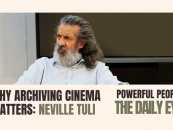
-173X130.jpg)
-173X130.jpg)
-173X130.jpg)
-173X130.jpg)
-173X130.jpg)
